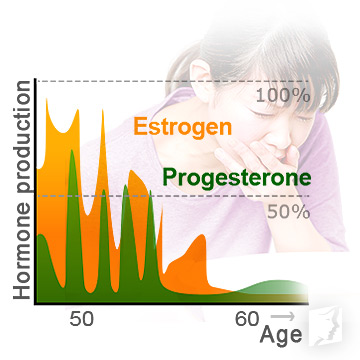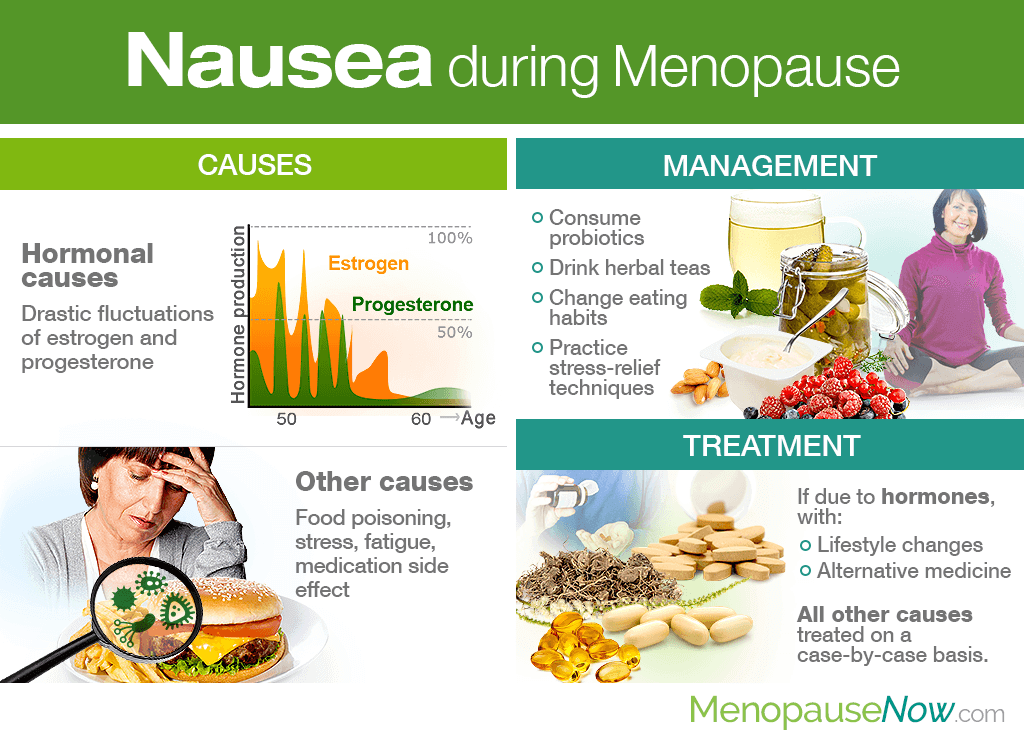While nausea is often associated with the early stages of pregnancy, there are other stages in a woman's reproductive life during which she may suffer from the symptom, menopause included. Continue reading to learn all about nausea during menopause, including what is it, what causes menopause nausea, management options, and how to go about treating it for long-lasting relief.
Can Menopause Cause Nausea?
Even though it is most characteristic of pregnancy, menopause can also cause nausea. Also, even though perimenopause nausea is most often caused by hormonal factors, there are others that could be bringing about the symptom.
Hormonal causes

Although the exact link between menopause and nausea is yet to be investigated, the symptom is credited to drastic hormonal fluctuations, principally of the reproductive hormones estrogen and progesterone.
It is not uncommon for a bout of nausea to happen alongside or following other menopause symptoms, like hot flashes - which are known to provoke feelings of intense heat, anxiety, and sweating - or other gastrointestinal problems, like bloating and indigestion.
Other causes

There are other reasons that women could be feeling nauseous during menopause that are not related to hormones, such as due to motion sicknesses, intense pain, food poisoning, stress, fatigue, as a medication side effect, and more. Check with your doctor to run the appropriate tests for diagnosis.
How Can I Manage Nausea during Menopause?

Finding perimenopause nausea relief can be accomplished by heeding some of the following management tips:
Drink plenty of water during meals. Seeing as nausea can occur due to indigestion, stay well hydrated while eating to help assist with digestion.
Consume probiotics. Probiotics help feed the good bacteria in the stomach to aid in digestion, thus providing perimenopause nausea relief.
Drink herbal teas. Herbal teas made with bitter herbs - dandelion, chamomile, peppermint, milk thistle, etc. - can help aid with digestion and cleanse the liver.
Change eating habits. Eat smaller meals more often, and if you like to snack, do so with seeds, nuts, fresh or dried fruits, yogurt, and other healthier options.
Participate in regular exercise. Exercises promotes proper peristalsis and elimination of food from the body, also known as healthy bowel movements.
Practice stress-relief techniques. Women who suffer from nausea during menopause due to stress should consider partaking in yoga, meditation, tai chi, deep breathing exercises, or other stress-reduction activities.
While these management techniques may keep menopause nausea at bay temporarily, long-term relief lies in treating the underlying cause.
How Can I Treat Menopause Nausea?

Women who are seeking long-lasting relief would do well by treating the underlying cause of perimenopause nausea, which - in most cases - is hormonal imbalance.
Menopause symptoms treatments for nausea and other bothersome symptoms focus on encouraging hormonal balance by enacting a variety of lifestyle changes alongside alternative medicine.
Lifestyle changes involve many of the aforementioned management techniques as well as diet improvements to include foods rich in phytoestrogens and wholesome habits that include quitting addictions known to worsen symptom severity.
Moreover, alternative medicines renowned for their effectiveness in promoting hormonal equilibrium include phytoestrogenic herbal supplements, which are useful for short-term use, and hormone-regulating supplements, which are preferential for long-term usage.
Menopause nausea that is caused by other reasons will be treated on a case-by-case basis according to what your doctor sees fit.
With proper initiative and a want for a symptom-free life, you can stop suffering from nausea during menopause once and for all.
Sources
- The Centre for Menstrual Cycle and Ovulation Research. (2013). Perimenopause: The Ovary's Frustrating Grand Finale. Retrieved April 16, 2019, from http://www.cemcor.ubc.ca/resources/perimenopause-ovary%E2%80%99s-frustrating-grand-finale
- Cleveland Clinic. (2013). Nausea & Vomiting | Nausea & Vomiting: Possible Causes. Retrieved April 16, 2019, from https://my.clevelandclinic.org/health/symptoms/8106-nausea--vomiting | https://my.clevelandclinic.org/health/symptoms/8106-nausea--vomiting/possible-causes
- John Hopkins Medicine. (n.d.). Introduction to Menopause. Retrieved April 16, 2019, from https://www.hopkinsmedicine.org/health/conditions-and-diseases/introduction-to-menopause

